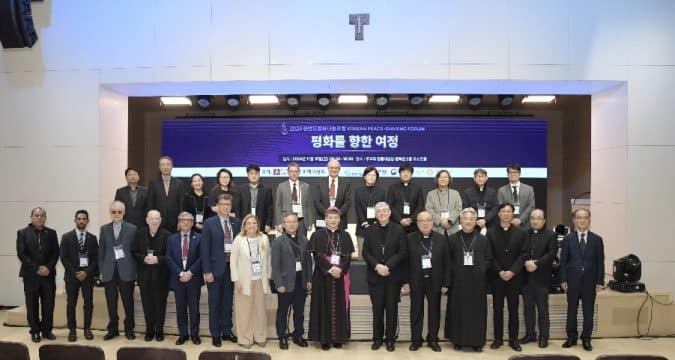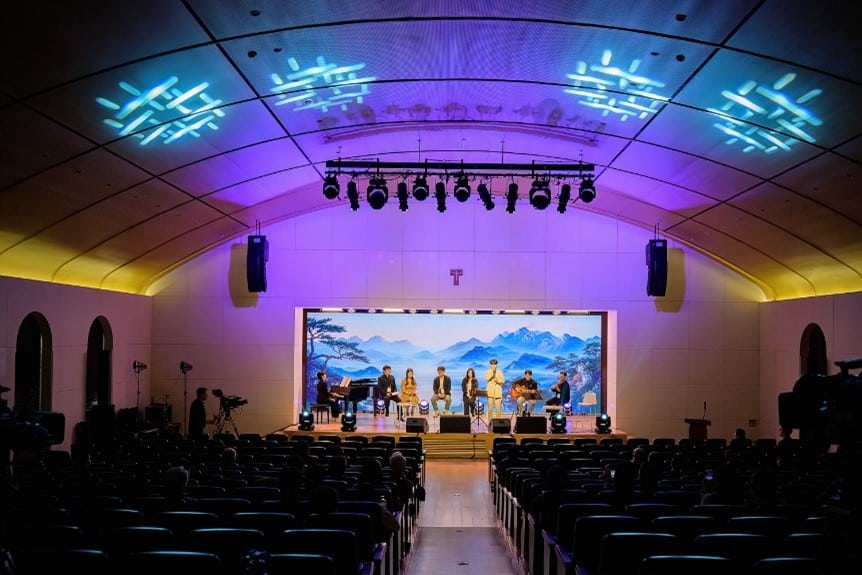
SEOUL (SE): The Korean Peninsula Peace-Sharing Forum 2024 was held at the Coste Hall in Myeongdong Cathedral, Seoul, South Korea on November 15.
Hosted by Korea Reconciliation Committee of the Archdiocese of Seoul, this year’s forum, which is in its ninth year, attempted something new.
In his welcome speech, Archbishop Peter Soon-taick Chung, chairperson of the Korea Reconciliation Committee and apostolic administrator of Pyongyang, noted that the theme of this year’s forum is “The Journey to Peace,” and that hope must prevail even if now the journey to peace seems long and arduous.
“I look forward to creating hope through discussing the role of the Church and the various ways of solidarity for peace on the Korean Peninsula and in the world,” Archbishop Chung said.

Youth Peace Talk Concert. Photo: Committee for Communications, Archdiocese of Seoul
Following the opening ceremony, Dr. Heinz-Gerhard Justenhoven, a lay theologian from Germany, explained the value of reconciliation in German reunification and examined the role of the Catholic Church. He argued that prayers for peace were at the heart of the endeavour. He also pointed out that old grievances can be revived at any time and exploited for political purposes so that “Christians must constantly remind the society of this and initiate new reconciliation actions.”
A second speaker, Dr. Marco Francioni, deputy director of the International Relations Office of the Community of Sant’Egidio, which has been engaged in humanitarian cooperation and dialogue with the North Korean authorities since 2011, emphsasised the “importance of dialogue” in the journey toward peace. He said that political and ideological divisions must not stop Christians from wanting to break down the walls that isolate entire countries, on the contrary, “our faith itself spurs us to open doors, to build bridges, not always easy to cross, to make hope grow.”
The Institute for Peace-Sharing of the Korea Reconciliation Committee presented two research projects. The first, called “The Church’s Awareness for Resolving the Conflict on the Korean Peninsula,” looked at how Church media was used to examine how to observe, judge, and act in order to promote peace on the Korean Peninsula.
Yiseul Seraphina Choi, a researcher at the Export-Import Bank of Korea and a member of Thomas Society, a Catholic youth research group, said, “We need to show more sustained interest in the lives of ordinary citizens, who can be considered the vulnerable class in North Korean society, and periodically release the Church’s voice to improve this.”
I look forward to creating hope through discussing the role of the Church and the various ways of solidarity for peace on the Korean Peninsula and in the world
Archbishop Peter Soon-taick Chung
The view of priests concerning unification and the Church was also examined their role as a bridge connecting the Church and believers is significant. Researchers surveyed approximately 5,700 Korean priests on their attitudes toward peace, unification, perception of North Korea, and the relationship between politics and religion. The percentage of priests who agreed with the need for unification was approximately 82 per cent, which was overwhelmingly higher than the response rate of the general public, 43 per cent, or Catholic faithful, 49 per cent.
There was also Youth Peace Talk Concert where young adults including young North Korean defectors discussed peace together. It was run by the mentor and mentee group, Ttiattmeori [love and friendship between brothers and sisters], run by Clerical Congregation of the Blessed Korean Martyrs to help North Korean defectors settle down. Young North Korean defectors and South Korean young people become mentors and mentees to build friendships.
“Experiencing faith together and becoming one spiritually has been a great help in settling down in South Korean society,” said one of the young North Korean defectors, who added that it was nice to have young South Koreans who listen to their stories with open hearts,
In his remarks, Archbishop Giovanni Gaspari, the apostolic nuncio, in the quoted Pope Francis’ encyclical, Fratelli Tutti, saying that religions have the duty to offer their “significantly contribution to building fraternity and defending justice in society.”
He also emphasised, “Fraternity is the alternative to war, it is the other possible horizon. It is a path to be taken together and which all men and women on earth, believers and non-believers, are called to take for a world at peace.”



